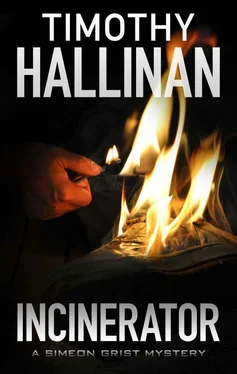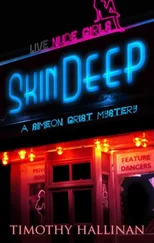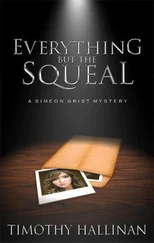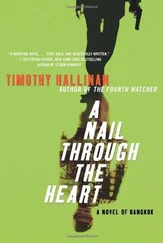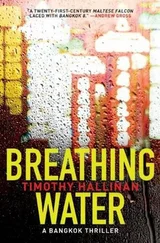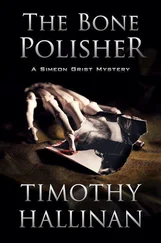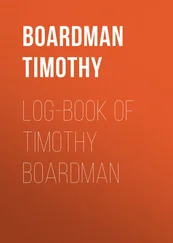Timothy Hallinan - Incinerator
Здесь есть возможность читать онлайн «Timothy Hallinan - Incinerator» весь текст электронной книги совершенно бесплатно (целиком полную версию без сокращений). В некоторых случаях можно слушать аудио, скачать через торрент в формате fb2 и присутствует краткое содержание. Жанр: Криминальный детектив, на английском языке. Описание произведения, (предисловие) а так же отзывы посетителей доступны на портале библиотеки ЛибКат.
- Название:Incinerator
- Автор:
- Жанр:
- Год:неизвестен
- ISBN:нет данных
- Рейтинг книги:4 / 5. Голосов: 1
-
Избранное:Добавить в избранное
- Отзывы:
-
Ваша оценка:
- 80
- 1
- 2
- 3
- 4
- 5
Incinerator: краткое содержание, описание и аннотация
Предлагаем к чтению аннотацию, описание, краткое содержание или предисловие (зависит от того, что написал сам автор книги «Incinerator»). Если вы не нашли необходимую информацию о книге — напишите в комментариях, мы постараемся отыскать её.
Incinerator — читать онлайн бесплатно полную книгу (весь текст) целиком
Ниже представлен текст книги, разбитый по страницам. Система сохранения места последней прочитанной страницы, позволяет с удобством читать онлайн бесплатно книгу «Incinerator», без необходимости каждый раз заново искать на чём Вы остановились. Поставьте закладку, и сможете в любой момент перейти на страницу, на которой закончили чтение.
Интервал:
Закладка:
You and I, though, perhaps you and I are brothers. Or, perhaps not. Perhaps you also are fuel. You would know more about that than I. Surely you can also smell the corruption. If you cannot, if you are also fuel, I will know it before you do. I will know it long before you do.
There was a double space, a breathing space, exactly ruled out on the brown paper of the shopping bag, an ironic choice of stationery given the possession of Abraham Winston, possessions that included a skinless-wiener factory, a forest, and the paper mill that turned the forest into the paper bags that happy housewives carried home from his supermarkets. After the double space, the gold-lettered, precisely formed message continued. Still as long as we’re chatting, I am not the Crisper, of all the ridiculous names. It sounds like the place where you keep the lettuce. I am, respectfully yours, the
— Incinerator
“He’s in his forties,” Hammond said to the very full room. “No one younger than that remembers incinerators. The law against burning trash passed in 1957.”
The comment fell flat. It lay in the center of the big conference table and writhed a while, waiting for someone to come to its assistance.
“Hey,” said the cop who was working the slide projector. “We through with this thing or not?”
“Not,” said the ranking cop in the room, a white-haired man with a flat stomach, high, narrow shoulders, and an alcoholic’s map of veins on his cheeks. “Just leave it on the screen.” He also had small, deeply set eyes and a mean pug nose that brought to mind the old joke about Polish bulldogs getting flat noses from chasing parked cars. The magnified version of the Incinerator’s letter, illuminated with metallic flames and floating spirits, remained on the wall. As before, the first capital initial was larger than the others, a carefully drawn Y arising from a bed of coals. Various people either looked at it or ignored it. There were a lot of people.
“I remember incinerators, too,” Annabelle Winston said. “We had them in Chicago.” Next to her, nodding agreement, sat Bobby Grant, wearing yet another safari shirt. This one had enough pockets to outfit the expedition that found Dr. Livingstone, with spare room to bring everybody home in. He’d removed the gold earring, a sensible move, in preparation for this meeting. On her other side sat a man whose clothes featured more buttons than a nuclear submarine. He had four buttons on each jacket cuff, buttons holding down the points of his IBM-white collar, a tiepin that was a silver button with a little diamond in its center, and a ring that was round and flat on top like a heavy gold button holding his hand on the table. In front of him was a closed attache case. He had a mouth like a snapping turtle and a forehead like a Mercator projection, which is to say that it bulged in the middle. He had to be a lawyer.
“So who’s Ahriman?” the ranking cop asked.
“The devil,” I said, since no one else volunteered, “in Zoroastrianism.” People looked blank. “An ancient Persian religion.”
“The Crisper’s a Persian?” Until he spoke, I hadn’t realized that Willick was in the room, but there he sat at the other end of the table, notebook in hand and chins blossoming over his collar. The question was greeted with a flinty silence, and Willick buried his drooping nose in his notes.
“The Zoroastrians worshiped fire,” I offered into the silence. “Their good god was the creator of light and fire, and their bad god, whose name was Ahriman, was the creator of darkness. They saw the world as a series of twelve-thousand-year cycles of light and darkness, with first one god ascendant and then the other. They kept perpetual fires burning in their temples.”
“They still do,” said a very small, balding man in civilian clothes who was sitting next to the man with all the buttons. He gave us all a bland smoker’s smile, unsheathing crooked amber-colored teeth. “I’m Dr. Schultz,” he said to me. “Dr. as in psychologist.”
“Simeon Grist,” I said.
“I know who you are,” Dr. Schultz said, making the teeth go away. The crinkly smile lines around his eyes stayed put, as though he’d drawn them on with a pencil.
“Just being polite,” I said.
Dr. Schultz had forgotten me. “He’s an educated man,” he said, looking over his shoulder at the projection of the note. “No grammatical errors, no spelling mistakes, good sentence structure, he’s got some familiarity with ancient religions. He uses perhaps frequently. Most people would say maybe.” He subsided, pleased with himself.
“What my client would like to know,” said the lawyer to the room at large, tapping his briefcase for emphasis, “is what you’re going to do to capture this maniac.” He put his hand flat on the table again, and the gold ring made a clacking sound that put a large black period at the end of his sentence.
“We’re working on it,” the captain said shortly.
“With all due respect, Captain,” Annabelle Winston said, almost pleasantly, “I’m not sure you are. But maybe-or, rather, perhaps — that’s because we don’t know what it is that you’re doing.”
“We’re doing everything that can be done,” the captain said flatly. “What do you suggest we should do?”
Annabelle Winston thought for a second. “I’m not a policeman,” she said. “I don’t know what you should be doing. But I know what I’m going to do if you don’t make me happy. Tell them, Fred.”
“We offer a reward of a million dollars,” Fred the lawyer said. Large cop feet scuffled nervously beneath the table.
“After taxes,” Annabelle Winston said quietly.
“After taxes,” the lawyer parroted, although his eyebrows, skyrocketing toward his hairline, revealed that this was clearly a bulletin as far as he was concerned, “to any citizen who conclusively identifies this… this Incinerator.”
“My God, you’re turning it into the lottery,” the captain said. Nobody else said anything. Hammond pulled out a cigar.
“Please don’t light that,” Annabelle Winston said. “I can’t stand smoke.”
I stared at her. I’d seen her smoke. Hammond’s face turned the color of rare roast beef. Captain or no captain, it was clear whose meeting this was.
“We’re prepared to post the reward at a press conference at two this afternoon,” Fred the lawyer continued. “That will enable the television-news operations to scoop the Times, as I understand it.” Bobby Grant gave a nod of encouragement.
“It’s more their kind of story,” he said. “They’ll go to town with it. And then, of course, there’s the radio news stations.”
“Has this press conference been announced?” That was the captain.
“Not yet,” Bobby Grant said, “but I can have it on the city news wire in five minutes.”
“You’re interfering with a police investigation,” the captain said. His face was redder than Hammond’s.
“What investigation?” Annabelle Winston asked. “We don’t know what that means. Forgive me, gentlemen, but my father died last night, and so did Leo Quint — was that his name, Leo Quint? That makes a total of seven, and where are you? Seven human beings.”
“Ten,” Dr. Schultz said.
The silence that followed was broken by the lawyer unsnapping his briefcase and taking out a pad. He made a note in a lawyer’s tiny handwriting. When he was finished, he looked at Dr. Schultz.
“Ten?” he said.
“None of this goes out of this room,” the captain interposed.
“Listen,” Annabelle Winston said, leaning forward to put her elbows on the table. “It goes wherever we want it to go if we’re not satisfied with the course of action you propose.”
“Miss Winston,” the captain said with leaden geniality. He sounded as though he were talking to a little girl who’d just asked for a pony for Christmas. “Surely some information is privileged.”
Читать дальшеИнтервал:
Закладка:
Похожие книги на «Incinerator»
Представляем Вашему вниманию похожие книги на «Incinerator» списком для выбора. Мы отобрали схожую по названию и смыслу литературу в надежде предоставить читателям больше вариантов отыскать новые, интересные, ещё непрочитанные произведения.
Обсуждение, отзывы о книге «Incinerator» и просто собственные мнения читателей. Оставьте ваши комментарии, напишите, что Вы думаете о произведении, его смысле или главных героях. Укажите что конкретно понравилось, а что нет, и почему Вы так считаете.
